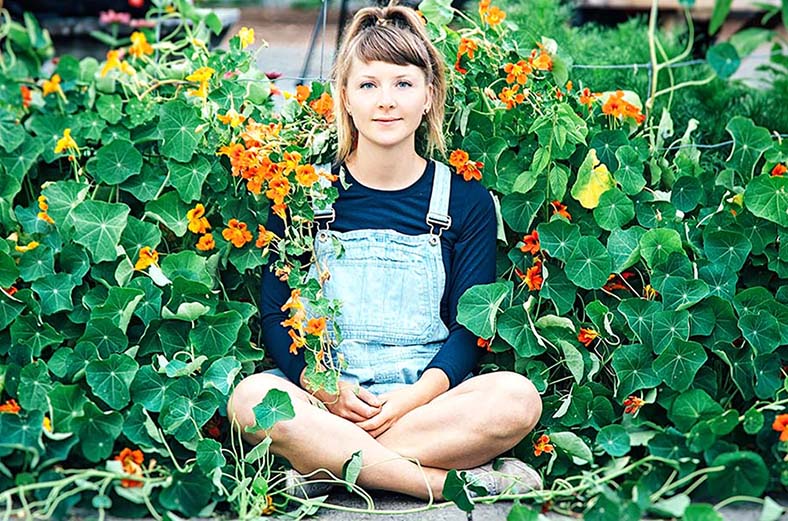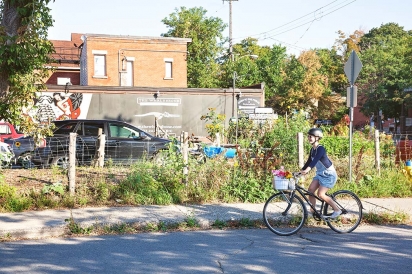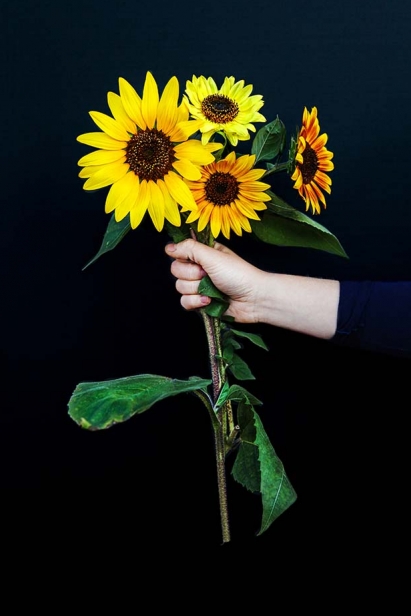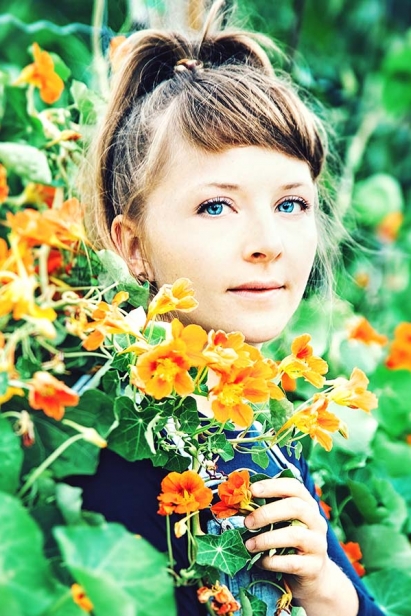Working for Food: Courtney Anne Craft - Growing and Serving Sustainability
Courtney Anne Craft is more than just a pair of green thumbs.
A long-time server at some of Ottawa’s best restaurants — her résumé boasts industry darlings Oz Kafe, the Manx Pub, and Supply and Demand — Craft, known for her horticultural pursuits and penchant for sustainability, has been dabbling in gardens for years.
First, there was her mother’s — an enviable veggie patch at Craft’s childhood home in small town Craighurst, Ont. Then came a gaggle of neglected planters on the roof of the Canadian Red Cross offices, where she worked as an administrative assistant after graduating Carleton University’s human rights program. On her lunch breaks, Craft filled the abandoned flowerpots with snap peas and quickly realized just how much food one person could grow.
This accidental bounty led the lively, pint-sized 28-year-old to enrol in Guelph University’s Sustainable Agriculture program to learn more about bringing better gardening practices and an eat-local attitude to cities around the world. After finishing her studies, Craft then spent last year tending San Francisco soil at Little City Gardens, the only commercial farm in the city. Recently, she returned to her Ottawa roots and now works as a gardener and server at the city’s popular oyster house, The Whalesbone.
Craft is something of a community food maven. When she’s not at The Whalesbone’s urban garden plot on the corner of Kent Street and Arlington Avenue, overall-clad, planting vegetables, herbs and edible flowers to distribute among restaurants and food projects around the city, she is hand delivering her produce to tables on the dining-room floor — a one-woman expression of the farm-to-table ideology.
Emily Rack and Jessie Duffy sat down with Craft to talk to her about her experiences and what she has learned from working for food.
WFF: What were you most excited about in the garden this year?
Courtney Anne Craft: Nasturtiums. They seem to be almost like an underdog. People don’t always know you can eat them, but they’re decadent and luxurious. You can eat the flowers, which are beautiful [and] packed full of nutrients. You can eat the leaves, the stems, the flowers and the seeds. They’re medicinal, self-seeding, and grow in crappy soil. They’re a power plant. In the garden I’ve learned so much — it’s important to see an ingredient in its entirety. People will cut off the tops of carrots and toss them out, but those are full of nutrients. Make a pesto. Chefs are good at that — being economical and a little ingenious about using every part of a plant.
WFF: Like snout to tail, but with plants.
CAC: Exactly. You have cuttings from the vegetables used in making a ratatouille or a stew, so boil them for veggie stock. Kitchens will do that because it’s economical, but it also uses the whole plant and gleans every ounce of nutrition from them.
WFF: How is Ottawa doing in terms of sustainable food production and use?
CAC: Ottawa is a small, lovely tightly knit community [of people] who support one another, including farmers, restaurants and purveyors of all sort of processed goods. There’s a nucleus in the restaurant industry and an outer community of farmers. It’s a community that I’ve been part of as long as I’ve lived here.
WFF: We wanted to hear your thoughts on serving and how that connects more to the food industry than people might see on the surface.
CAC: It’s something I think about a lot. To be in a group of people as a server, I always feel like I have to explain myself, like…I’m a server, but, I’m a server, and… Serving is an integral part of the Ottawa food scene. If you’re a server who enjoys food, enjoys the kitchen team, who is impassioned by the ingredients you present to people and wants to teach something — that’s as much a career as anything else. It’s hard sometimes to remind yourself that this is a job you can be proud of, but I think it is. You are essentially the main connection between people who may not know much about food or are curious about food and the people providing that food.
WFF: Or the people who love it and you get to celebrate that.
CAC: Exactly, and you can all be stoked on the dish. And you get to bring the story of how it got there.
WFF: What’s your priority in selecting a restaurant to be part of?
CAC: When I first started at Oz [Kafe], I didn’t know what I was looking for. Once I saw Dan O’Brien, of O’Brien Farms, with his amazing local meat and Ian Walker, of Mariposa Farm, dropping off this huge bounty, I was excited by the local connection and special relationship. Chefs can’t do what they do without this food, and the farmers can’t do what they do without the enthusiasm of local chefs and the support of owners who make that food a priority in their establishments. I couldn’t settle for less.
WFF: What should our goal be in Ottawa?
CAC: Maintaining green space and strong ties to farmers that surround the city. We’re so lucky to have green space and amazing farms close to our city centre providing us with exceptional, nutritious food. I would encourage every Ottawan to consider local sources for food wherever possible.
WFF: In other words, be thoughtful in your food purchases.
CAC: Yes, you may not shop for all your food at the farmers’ market, but if you buy a bunch of carrots there, you’ve contributed to sustaining a food system in a small way. Or, if you have a balcony and you’re growing some small basil plants, they will flower and a bee will pollinate them, and you are contributing in a small way to sustaining the food system in the city and [to] your own nourishment. Perhaps someone will look at that plant on your balcony and want to do it themselves, where they hadn’t thought of it before.
WFF: And what’s next for you?
CAC: I feel most productive when I’m working with my hands, my body and my voice. Nothing gives me more pleasure than when people walk past the [Whalesbone] garden and have a million questions or stories that start with, “I had a garden once.” The garden itself opens up communication. And so does a job like serving. You’re instantly folded into a person’s experience [with] food. I would love to make a career of growing food, but if that’s not a viable option, I’m lucky that I can rely on serving. Not just as a fallback, but as another way I can contribute to people’s experience [with] food and still make a living.
WFF: A lot of people in this series and in this realm consider themselves to be stewards of food systems. How do you see yourself?
CAC: I prefer to be more of a student. As much as I’m a steward, and am teaching passersby, I ask my farmer friends and my chefs for advice. There is a lovely duality in being a teacher and a student. I’ve only had a garden for two years, and as much as I would call myself a steward, I would never call myself a farmer. Maybe it’s out of respect for the farmers I know who sacrifice a ton — their security, their bodies, their time, their social lives — for cultivating land and nurturing plants for food. Maybe out of reverence for those folks, I feel like I am a bit of a sidekick, rather than a superhero [laughs]. For now at least.









